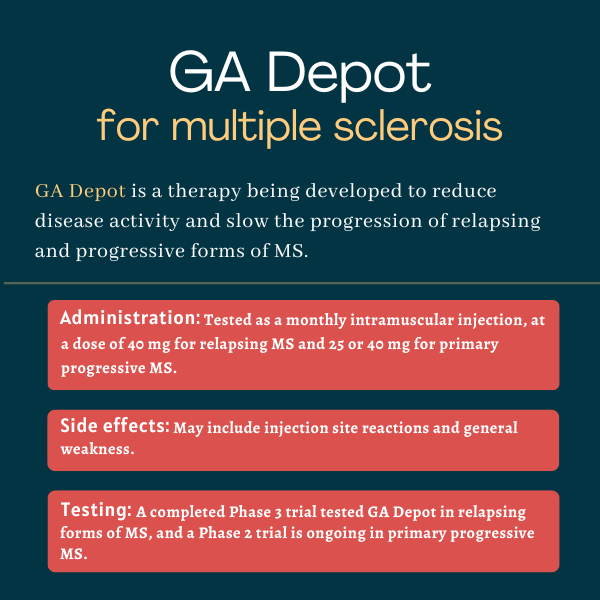FAQs about GA Depot in MS
The active ingredient in GA Depot, glatiramer acetate, is approved to treat relapsing forms of multiple sclerosis (MS). Glatiramer acetate is thought to modulate the immune system to reduce the inflammatory attack that drives MS, and has shown the ability to reduce relapses and lesions and slow disability progression. The new formulation is designed to be administered once per month via intramuscular injections, allowing less frequent dosing than currently approved therapies.
Mapi and Viatris, which are co-developing GA Depot, have asked the U.S. Food and Drug Administration (FDA) to approve the therapy for relapsing forms of multiple sclerosis, but the agency in March 2024 declined to approve the regulatory application. The companies said they would review the FDA’s complete response letter to determine the next steps for GA Depot, but no updates have been shared since.
Clinical trials testing GA Depot have not enrolled participants who were pregnant or breastfeeding. It is therefore unknown whether the experimental medication is safe for use in these situations. Other formulations of glatiramer acetate also have not been rigorously studied during pregnancy.
In an early clinical trial that enrolled patients who had been on stable Copaxone treatment for their multiple sclerosis, most who switched to GA Depot showed no signs of disease activity — including no relapses, disability worsening, or new MRI lesions — after one year of treatment.
Hair loss and weight gain have not been reported as side effects of GA Depot in clinical trials. Studies testing other formulations of glatiramer acetate also have not reported these side effects. Patients who experience unexpected reactions after starting a new medication are advised to consult their healthcare teams.
Related Articles

 Fact-checked by
Fact-checked by 






